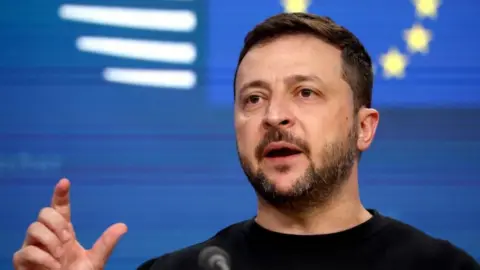Trump-Putin call lowers the temperature but at Ukraine's expense
 EPA
EPAThings are moving very fast when it comes to efforts to end the war in Ukraine.
Unfortunately for Kyiv, it is not in the driving seat.
The news that the leaders of the two most heavily armed nuclear nations - Russia and the US - have held a seemingly constructive and cordial 90 minute phone call is, at face value, a welcome step towards a more peaceful world.
Donald Trump and Vladimir Putin clearly have a good working relationship, in marked contrast to the previous occupant of the White House, Joe Biden.
So for now, the temperature has been lowered - but this positive move may well come at Ukraine's expense.
The words of Pete Hegseth, the US defence secretary, earlier today will have come as an ice cold shower to many in Ukraine, dashing a lot of their hopes for a secure future, free from the menace of further Russian invasions.
They are also a blow to some of Kyiv's closest backers in Nato who wanted to keep the pressure on Moscow in the hopes of exhausting its faltering economy.
Pete Hegseth laid out in crystal clear terms where the US stands on peace for Ukraine, in words that will no doubt be welcomed by Moscow.
No US troops for Ukraine in any future security arrangement.
No likelihood of Ukraine joining NATO.
No realistic possibility of returning to its pre-2014 borders, when Russia occupied and annexed Crimea and backed insurgents in the Donbas.
These were all clearly stated goals made by President Volodymyr Zelensky and his government and they come on top of a dire situation on the battlefield, where Russia's superior numbers are enabling it to slowly push deeper into Ukrainian territory.
This is all in stark contrast to the oft-repeated and now rather hollow sounding Western mantra of sustaining Nato support for Ukraine "for as long as it takes".
Trump wants an early end to this war, even if it means forcing Ukraine to swallow some very bitter pills indeed.
He sees the war as Europe's problem and for Europe to sort out.
He has other priorities, like securing America's southern border or focussing on trade, tariffs, China and the Pacific.
More details of US peace proposals will likely emerge at this weekend's high-level Munich Security Conference, due to be attended by US Vice President J D Vance and Zelensky.
It is more than possible that a deal can eventually be reached involving thousands of European and non-European peacekeeping troops, or some kind of aid-for-minerals deal with Washington that gives the US access to Ukraine's substantial deposits of rare earth minerals like lithium.
But for now, 12 February will go down in Ukraine's calendar as a tough day when a new and unwelcome reality took hold.
